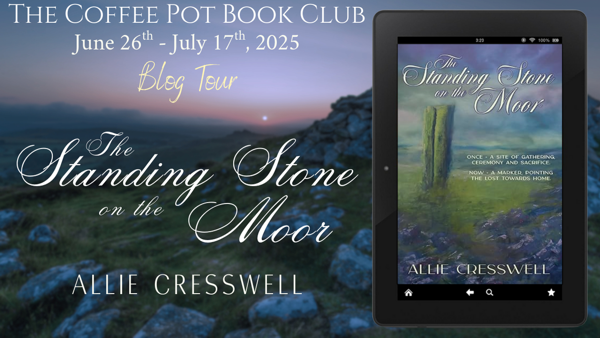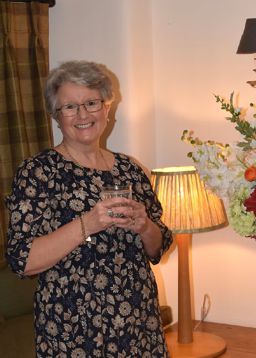
Yorkshire, 1845.
Folklore whispers that they used to burn witches at the standing stone on the moor. When the wind is easterly, it wails a strange lament. History declares it was placed as a marker, visible for miles—a signpost for the lost, directing them towards home.
Forced from their homeland by the potato famine, a group of itinerant Irish refugees sets up camp by the stone. They are met with suspicion by the locals, branded as ‘thieves and ne’er-do-wells.’ Only Beth Harlish takes pity on them, and finds herself instantly attracted to Ruairi, their charismatic leader.
Beth is the steward of nearby manor Tall Chimneys—a thankless task as the owners never visit. An educated young woman, Beth feels restless, like she doesn’t belong. But somehow ‘home’—the old house, the moor and the standing stone—exerts an uncanny magnetism. Thus Ruairi’s great sacrifice—deserting his beloved Irish homestead to save his family—resonates strongly with her.
Could she leave her home to be with him? Will he even ask her to?
As she struggles with her feelings, things take a sinister turn. The peaceable village is threatened by shrouded men crossing the moor at night, smuggling contraband from the coast. Worse, the exotic dancing of a sultry-eyed Irishwoman has local men in a feverish grip. Their womenfolk begin to mutter about spells and witchcraft. And burning.
The Irish refugees must move on, and quickly. Will Beth choose an itinerant life with Ruairi? Or will the power of ‘home’ be too strong?

Excerpt
Now, Lord and Lady Riding were—by their rank—very august personages, probably the foremost lady and gentleman in that part of the country, ancient possessors of the title and countless acres of countryside. But they were, in the flesh, rather less than their title and holdings might suggest. Lord Riding was bald dowdy and small, a shy man who much preferred his hounds and horses—and even his ploughmen—to the bishops and earls and dukes with whom he was required to rub shoulders when the Upper House was in session. It is a recorded fact that he had never opened his mouth in the House of Lords, not so much as to state the least opinion or to ask the most innocuous question. His ‘yay’ or ‘nay’ had hardly such volume or substance that would sway a vote in any direction.
He had been bewildered, and in truth rather annoyed, to receive the Somersalls’ invitation, but his wife had urged its acceptance.
‘There is a marriageable son,’ she said, ‘and we have Veraminta and Petronella to consider.’
Lady Riding was much the larger character of the two, both in height—she overtopped her husband by a full head—and in energy. She outdid him in riding and hunting, and was a better shot. She was not at all chary of voicing heropinion, the scourge of the master of hounds, of the local clergy, of the sitting member for Riding, of her own butler, and—it may as well be admitted—of her own husband.
She was the mother of daughters, all but two of whom were tolerably well-settled in life. She had borne no sons, and this of course was a disappointment to her, but she did not allow it to embitter her, finding a daily allowance of port wine and frequent application to her snuff box after a day of exercise to be enough to allay the regret. She was rather weatherbeaten, her cheeks mapped with broken veins, the merest suggestion of moustache made ginger by the staining of snuff. Her hair was thin and without beauty, and she had a skewed eye that interlocutors found somewhat unsettling. But she was determined to see the last of her girls settled, and so however unpromising the alliance, she had acceded to the invitation and had her daughters scrubbed and coiffed for the occasion.
As for the two girls—or young women, as we must say, and perhaps, as to that, not so very young—they were absolutely vapid, plain and spinsterish. They had dull complexions, dull hair and dull unintelligent eyes. Their teeth were bad, their posture worse. They sloped into the room droop-shouldered, their chins on their chests, unable to meet any eye. Their dresses were old, much made over, and so similar to each other that they offered the rest of the guests no clue as to which honourable lady was which, and as their father garbled their names when he introduced them, he provided no enlightenment.
Universal Buy Link: https://books2read.com/u/b5P5pG
Meet Allie Cresswell

Allie has been writing fiction since she could hold a pencil. She has a BA and an MA in English Literature, specialising in the classics of the nineteenth century.
She has been a print-buyer, a pub landlady, a bookkeeper and the owner of a group of boutique holiday cottage but nowadays she writes full time.
She has two grownup children, five grandchildren and two cockapoos but just one husband, Tim. They live in the remote northwest of the UK.
The Standing Stone on the Moor is her sixteenth novel.
Connect with Allie
Website: https://www.allie-cresswell.com/
Facebook: https://www.facebook.com/alliecresswell
Instagram: https://www.instagram.com/allienovelist/
Threads: https://www.threads.com/@allienovelist
Book Bub: https://www.bookbub.com/authors/allie-cresswell
Amazon Author Page: https://amzn.to/3GAaPXw
Goodreads: https://www.goodreads.com/author/show/6457033.Allie_Cresswell